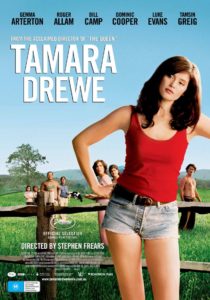The literary works of Thomas Hardy have been adapted many times over the years, most notably as plays, television mini-series and feature films. Although often occupied with the social constraints placed on the lives of people living within the 19th century class structure, the themes of fate (and fatalism for that matter) inherent in the Victorian Realist’s novels still resonate strongly with modern audiences. Tamara Drewe is not a direct adaptation of a Thomas Hardy novel, but is instead based on Posy Simmonds’ newspaper comic strip of the same name, itself adapted from Hardy’s Far From the Madding Crowd. Reworking the graphic novel for the screen, Moira Buffini’s script is brought to life by venerable British direction Stephen Frears (The Queen).
In the fictional town of Ewedown in Dorset, famous crime writer and philanderer Nicholas Hardiment (Roger Allam, A Cock and Bull Story) and his wife Beth (Tamsin Grieg, Black Books) run a retreat for budding writers. The locals and retreating writers are thrown into a spin when former local Tamara Drewe (Gemma Arterton, Prince of Persia: The Sands of Time) returns to the village to sell her home. Once the butt of a joke due to an unseemly nose, Tamara now turns a few heads thanks to a neat bit of plastic surgery and a sassy attitude gained from a career as a reporting journalist. Old flame and gardener Andy (Luke Evans, one of Arterton’s co-stars in Clash of the Titans) maintains a crush on Tamara, and an interest in his ancestral home that Tamara is trying to offload. Meanwhile, Tamara has an affair with rock star Ben (Dominic Cooper, An Education) which sends the town into a further whirl, especially two young girls with a crush on Ben.
Like many of Thomas Hardy’s works, Far From the Madding Crowd has been described as an early piece of feminist literature. There are definitely some strong female characters in Tamara Drewe, especially the character of Beth who has largely run the Hardiment empire behind the scenes. Indeed, all the men are such buffoons, fools or merely so self-centred that it is amazing their lives continued at all outside of the confines of this film. All are quirky and distinguishable characters to be sure, but caricatures is a more apt description of the people we see on scree. However, the character whose mere presence propels the story along at a rate of knots, that of Tamara herself, is a unlikeable one. The easy-on-the-eyes Arterton is no stranger to playing Hardy heroines, having recently taken the lead in the excellent Tess of the D’Urbervilles mini-series, but here fails to connect with the audience. Keeping the villagers from her past at arm’s length, at least the ones she isn’t shagging, Tamara comes off as wholly unsympathetic leaving us with the absence of a real hero. The closest we get is Andy, the simple country boy who has simple country dreams, but he is given little to do other than pine throughout much of the script.
One of the characteristics of a Hardy tale is the notion of fate, and that once things have been set in motion, they will naturally play out. This is the perfect playground for a romp such as this, and Frears definitely has an appreciation for the wild and unpredictable paths that a fated comedy of errors such as this can create. Unfortunately this adaptation comes off as less Thomas Hardy and more of a less-funny Woody Allen’s A Midsummer Night’s Sex Comedy. The concept of fate here is translated as inevitability: we know exactly who is going to get together with who from the outset, and character arcs are not so much followed as presented whole. The two young girls who act as a Greek chorus remind us, frequently, of what we are watching on-screen (in case we had gone both blind and deaf) and while they actively push the story along at times, they also threaten to slow it down and derail it more often than not.
For all of its problems, there is still much to like in this breezy lighthearted tale, seemingly the antithesis of Hardy’s weightier works Jude the Obscure and, of course, Tess of the D’Urbervilles. Indeed, Far from the Madding Crowd is one of the few Hardy novels where the fates favour the lead. Tamara Drewe is like an ice-cream on a summer’s day: a welcome relief from the heat, but occasionally spills out over the sides of the cone. Those seeking a more faithful adaptation of Far From the Madding Crowd may look forward to David Nicholls’ (Tess of the D’Urbervilles) BBC adaptation in the near future.
Tamara Drewe opens at cinemas around Australia on 24 February 2011, with preview screenings throughout the summer.






No Responses